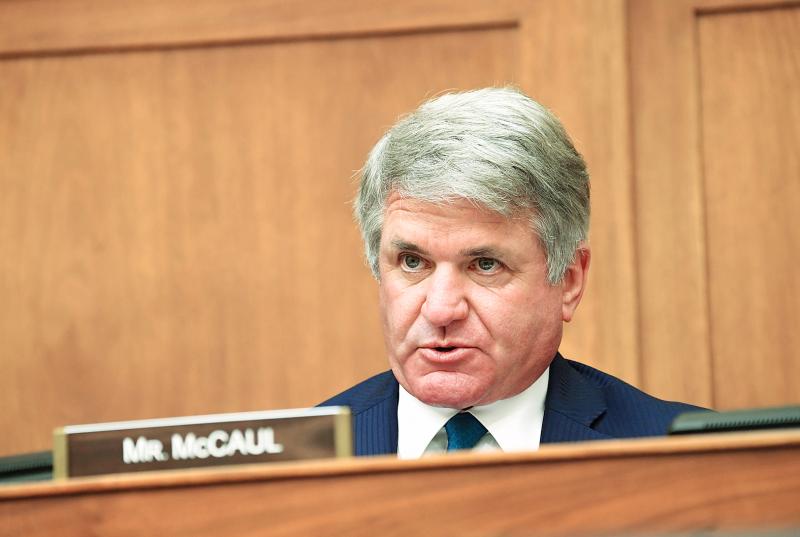The Ministry of Foreign Affairs yesterday thanked US lawmakers after a congressional task force published a report suggesting that the US government initiate trade negotiations with Taiwan and pass legislation to boost bilateral relations as soon as possible.
Taiwan would continue efforts to deepen ties with the US, the ministry said, after the US House of Representatives’ China Task Force on Wednesday published a report that highlighted threats that Beijing poses to the US.
“Taiwan is a bona fide democracy and a de facto sovereign nation, and US security ally,” the report said. “Taiwan is a critical focal point in the free world’s confrontation with the CCP [Chinese Communist Party], and under a more direct threat of CCP armed aggression than any other US partner.”

Photo: AFP
“The [US] administration should allow Taiwan to change the name of its diplomatic office to the ‘Taiwan Representative Office’ or a similar title,” it said. “Taiwan’s primary diplomatic organization inside the US is currently called the ‘Taipei Economic and Cultural Representative Office,’ an anachronistic title that does not reflect the fact that the US enjoys broad, substantial relations with all of Taiwan, not just its capital city.”
The US Congress should “support Taiwan’s acquisition of asymmetric capabilities for self-defense and the implementation of its Overall Defense Concept,” and continue to approve sales of arms to it as part of efforts to fulfill long-term US security commitments, it said.
“The CCP’s economic system is threatening US national security and foreign policy interests,” the report said, adding that China’s “unfair trade practices pose particular challenges because they systematically undermine fair competition and create damaging global overcapacity through grossly distorting subsidization, IP [intellectual property] theft, forced technology transfer, localization policies, and the use of state-owned enterprises to outcompete US companies.”
The administration should “deepen our trade ties with Taiwan and resolve specific outstanding trade issues so the administration can take steps to launch trade agreement negotiations once those issues are addressed,” it said.
The US Congress should pass the Taiwan Symbols of Sovereignty Act, the Taiwan Fellowship Act and the Taiwan Non-Discrimination Act, as well as ensure final passage of the Taiwan Assurance Act, it said.
Ministry spokeswoman Joanne Ou (歐江安) yesterday thanked the US lawmakers for their calls for the US government to take concrete action to deepen bilateral ties.
The ministry would communicate with US administrative agencies and US representatives to advance the friendship, Ou said.
The task force, established by 15 Republicans this year, is chaired by US Representative Michael McCaul.
The report also touched upon topics such as sanctions against Chinese telecommunications companies allegedly engaged in economic or industrial espionage in the US, evaluations of Beijing’s crackdown on Uighur Muslims in Xinjiang and whether the oppression constitutes genocide, and the origins of the COVID-19 pandemic, as well as Beijing’s failures to contain the novel coronavirus in its early stages.

CHAOS: Iranians took to the streets playing celebratory music after reports of Khamenei’s death on Saturday, while mourners also gathered in Tehran yesterday Iranian Supreme Leader Ayatollah Ali Khamenei was killed in a major attack on Iran launched by Israel and the US, throwing the future of the Islamic republic into doubt and raising the risk of regional instability. Iranian state television and the state-run IRNA news agency announced the 86-year-old’s death early yesterday. US President Donald Trump said it gave Iranians their “greatest chance” to “take back” their country. The announcements came after a joint US and Israeli aerial bombardment that targeted Iranian military and governmental sites. Trump said the “heavy and pinpoint bombing” would continue through the week or as long

TRUST: The KMT said it respected the US’ timing and considerations, and hoped it would continue to honor its commitments to helping Taiwan bolster its defenses and deterrence US President Donald Trump is delaying a multibillion-dollar arms sale to Taiwan to ensure his visit to Beijing is successful, a New York Times report said. The weapons sales package has stalled in the US Department of State, the report said, citing US officials it did not identify. The White House has told agencies not to push forward ahead of Trump’s meeting with Chinese President Xi Jinping (習近平), it said. The two last month held a phone call to discuss trade and geopolitical flashpoints ahead of the summit. Xi raised the Taiwan issue and urged the US to handle arms sales to

BIG SPENDERS: Foreign investors bought the most Taiwan equities since 2005, signaling confidence that an AI boom would continue to benefit chipmakers Taiwan Semiconductor Manufacturing Co’s (TSMC, 台積電) market capitalization swelled to US$2 trillion for the first time following a 4.25 percent rally in its American depositary receipts (ADR) overnight, putting the world’s biggest contract chipmaker sixth on the list of the world’s biggest companies by market capitalization, just behind Amazon.com Inc. The site CompaniesMarketcap.com ranked TSMC ahead of Saudi Aramco and Meta Platforms Inc. The Taiwanese company’s ADRs on Tuesday surged to US$385.75 on the New York Stock Exchange, as strong demand for artificial intelligence (AI) applications led to chip supply constraints and boost revenue growth to record-breaking levels. Each TSMC ADR represents

State-run CPC Corp, Taiwan (CPC, 台灣中油) yesterday said that it had confirmed on Saturday night with its liquefied natural gas (LNG) and crude oil suppliers that shipments are proceeding as scheduled and that domestic supplies remain unaffected. The CPC yesterday announced the gasoline and diesel prices will rise by NT$0.2 and NT$0.4 per liter, respectively, starting Monday, citing Middle East tensions and blizzards in the eastern United States. CPC also iterated it has been reducing the proportion of crude oil imports from the Middle East and diversifying its supply sources in the past few years in response to geopolitical risks, expanding